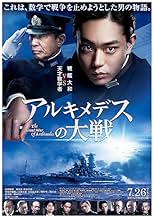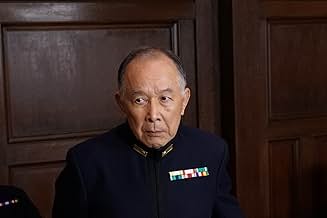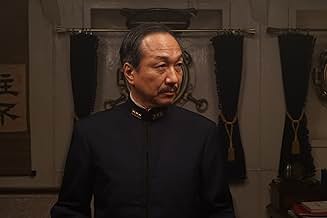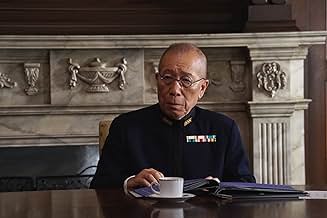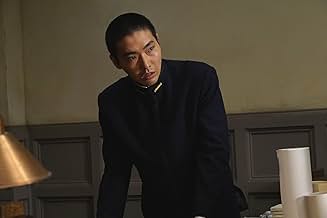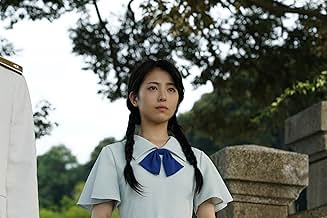Arukimedesu no taisen
- 2019
- 2h 10min
VALUTAZIONE IMDb
6,7/10
1321
LA TUA VALUTAZIONE
Aggiungi una trama nella tua linguaIn 1933, a young naval officer and math prodigy uncovers a conspiracy regarding the construction of Japanese warships for the ongoing World War 2.In 1933, a young naval officer and math prodigy uncovers a conspiracy regarding the construction of Japanese warships for the ongoing World War 2.In 1933, a young naval officer and math prodigy uncovers a conspiracy regarding the construction of Japanese warships for the ongoing World War 2.
- Regia
- Sceneggiatura
- Star
- Premi
- 4 candidature totali
T.J. Anthony
- Osami Nagano
- (English version)
- (voce)
Luis Bermudez
- Mr. Osato
- (English version)
- (voce)
Jacob Eiseman
- Various Soldiers and Walla
- (English version)
- (voce)
Alex Hom
- Shojiro Tanaka
- (English version)
- (voce)
Chase Kloza
- Additional voices
- (English version)
- (voce)
Lizzy Laurenti
- Walla
- (voce)
Nicholas Markgraf
- Additional Voices
- (English version)
- (voce)
- …
Recensioni in evidenza
First it must be stated that this in no way is a 'war movie' as most think of it. The only direct depiction of battle occurs in the beginning of the movie, and as others have said requires some background knowledge of the actual history to grasp what is being depicted. However, I found it striking (and others without the historical knowledge can do likewise) to think back on this scene after the architect describes the ship's purpose later in the movie. I have no idea how accurate the movie is in depicting the actual sentiment's of the architect, but regardless it struck me and made me rethink how I viewed the construction of the ship in question.
At this point it must also be said that the dubbing of the movie does it no favors (besides not requiring a fluency in Japanese to view). The dubbed voices of all figures accept Yamamoto seemed to me to often not reflect the sentiments of the action depicted, which does detract from the viewing experience. However, they do serve to make the movie understandable for non-Japanese speakers such as myself, and for that at least I am grateful. I'm not sure if it is possible to watch the movie in Japanese but simply with English subtitles, but it is something to look into if you find the dubbing too jarring to watch the movie otherwise.
Returning to the rest of the movie, it follows the discussion of how the Imperial Japanese Navy (IJN) planned to expand during the 1930s, when war with the world was not yet actuality, but could be seen on the horizon. It therefore closely examines (with a background of the internal politics of the Japanese armed forces) the debate over two potential paths of expansion, and the costs behind each one. Cue the wiz-kid with a knack for numbers, called in to question the expected costs of one of the plans. And here is where the viewer intent on a stereotypical war movie will lose interest; but for those who continue watching, they will likely leave with a much greater appreciation for all of the abstract mathematical concepts they suffered through in school (I know I for one left seeing much better the usefulness of optimization and regression than when I began). This is a war movie that considers the intellectual backing of the effort, whether that be calculations, counterintelligence, or even how to effectively utilize (or counter if need be) the underpinnings of a nation at war; and that is not something with a terribly large audience of interest. But for those interested in such things, I found the movie a terrific watch.
At this point it must also be said that the dubbing of the movie does it no favors (besides not requiring a fluency in Japanese to view). The dubbed voices of all figures accept Yamamoto seemed to me to often not reflect the sentiments of the action depicted, which does detract from the viewing experience. However, they do serve to make the movie understandable for non-Japanese speakers such as myself, and for that at least I am grateful. I'm not sure if it is possible to watch the movie in Japanese but simply with English subtitles, but it is something to look into if you find the dubbing too jarring to watch the movie otherwise.
Returning to the rest of the movie, it follows the discussion of how the Imperial Japanese Navy (IJN) planned to expand during the 1930s, when war with the world was not yet actuality, but could be seen on the horizon. It therefore closely examines (with a background of the internal politics of the Japanese armed forces) the debate over two potential paths of expansion, and the costs behind each one. Cue the wiz-kid with a knack for numbers, called in to question the expected costs of one of the plans. And here is where the viewer intent on a stereotypical war movie will lose interest; but for those who continue watching, they will likely leave with a much greater appreciation for all of the abstract mathematical concepts they suffered through in school (I know I for one left seeing much better the usefulness of optimization and regression than when I began). This is a war movie that considers the intellectual backing of the effort, whether that be calculations, counterintelligence, or even how to effectively utilize (or counter if need be) the underpinnings of a nation at war; and that is not something with a terribly large audience of interest. But for those interested in such things, I found the movie a terrific watch.
This movie is an insight into modern Japanese thought and modern Japanese propaganda. It contains ideas and explications about the war of the 1930s and 1940s that put a better face on those disasters, at least for the Japanese viewer. But it does so with a minimum of distortion of the facts, showing respect for a highly literate society. It shows a sophistication that is far above the propaganda that is daily fed to American society.
The blame for getting the country into its impossible situation is deftly removed from the governing personalities of the time and, predictably, the emperor is never mentioned in this war film. It is imperative in Japanese culture that no blame be attributed to him, not even an implicit guilt that could be inferred from its denial.
Mention is made of the mood of the country and the indomitable attitude of the Japanese population, buoyed up as it was at the time by an broken series of successes on the Asian mainland. A grand admiral of the imperial navy grimly allows that the public's enthusiasm cannot be inhibited and that it would inexorably lead to war against the western powers. He points out that Japan is already heavily invested in a war in China. These circumstances, combined with the world's reaction to the aggression in Asia, and Japan's withdrawal from the League of Nations, will force war on the Japanese whether they want it or not.
As an aside, Grand Admiral Yamamoto is credited/blamed for originating the idea of destroying the American fleet at Pearl Harbor.
The story line bases on a plot to sell a plan the government on a plan to build the world's biggest battleship, the Yamato, (a real ship which in fact was built by Japan in the 1930s). There is suspense over the amount of funding this will require and competition for the budget from a faction that wants to build aircraft carriers instead. There is no mention of the violation of treaties in building the over-sized ship.
Enter a handsome, brilliant, young man who will unravel all the plotting with some surprising plot twists along with a slight romantic interest with the daughter of a conniving industrialist. He, Tadashi Kai, (superbly acted by Suda Masaki*) is the vehicle that carries us through the story. He also symbolizes the rebel who takes on the establishment and prevails with his fresh, independent insights. Yet, ingeniously, the establishment itself comes through it without serious damage.
The high-ranking Japanese naval officers are depicted with great dignity and ability, though less honesty, throughout the movie. The story reassures the Japanese audience that Japan's motives in the war were honorable and the disasters largely pressed on the country by outside or otherwise overwhelming forces. Other than that it's a very watchable movie, well done with good acting and a very well written story. There are numerous reasons to watch this excellent movie; I hope I have touched upon the more salient of these.
* These Japanese names are in the Asian order, given name following the family name.
The blame for getting the country into its impossible situation is deftly removed from the governing personalities of the time and, predictably, the emperor is never mentioned in this war film. It is imperative in Japanese culture that no blame be attributed to him, not even an implicit guilt that could be inferred from its denial.
Mention is made of the mood of the country and the indomitable attitude of the Japanese population, buoyed up as it was at the time by an broken series of successes on the Asian mainland. A grand admiral of the imperial navy grimly allows that the public's enthusiasm cannot be inhibited and that it would inexorably lead to war against the western powers. He points out that Japan is already heavily invested in a war in China. These circumstances, combined with the world's reaction to the aggression in Asia, and Japan's withdrawal from the League of Nations, will force war on the Japanese whether they want it or not.
As an aside, Grand Admiral Yamamoto is credited/blamed for originating the idea of destroying the American fleet at Pearl Harbor.
The story line bases on a plot to sell a plan the government on a plan to build the world's biggest battleship, the Yamato, (a real ship which in fact was built by Japan in the 1930s). There is suspense over the amount of funding this will require and competition for the budget from a faction that wants to build aircraft carriers instead. There is no mention of the violation of treaties in building the over-sized ship.
Enter a handsome, brilliant, young man who will unravel all the plotting with some surprising plot twists along with a slight romantic interest with the daughter of a conniving industrialist. He, Tadashi Kai, (superbly acted by Suda Masaki*) is the vehicle that carries us through the story. He also symbolizes the rebel who takes on the establishment and prevails with his fresh, independent insights. Yet, ingeniously, the establishment itself comes through it without serious damage.
The high-ranking Japanese naval officers are depicted with great dignity and ability, though less honesty, throughout the movie. The story reassures the Japanese audience that Japan's motives in the war were honorable and the disasters largely pressed on the country by outside or otherwise overwhelming forces. Other than that it's a very watchable movie, well done with good acting and a very well written story. There are numerous reasons to watch this excellent movie; I hope I have touched upon the more salient of these.
* These Japanese names are in the Asian order, given name following the family name.
This is a fictionalized story is based on a manga and is not meant to be historically accurate. The first exciting 15 minutes of the movie made me think it was a war film. Instead it is a tale of a mathematician, who 9 years before the battle, tried heroically to prevent a money wasting battleship from being built for Japan's pre-WW2 navy instead of a carrier built on behalf of the forward thinking General Yamamoto.
The attack on the battleship at the beginning was well done and exciting. The main character ,played by Masaki Suda, gives an award-winning quality performance. The rest of the cast is good as well. Watching it in the original Japanese will better reflect their performances. There are some not so believable elements that you'll need to put aside in order to better enjoy the film. The final act has a poignant and surprising twist.
The attack on the battleship at the beginning was well done and exciting. The main character ,played by Masaki Suda, gives an award-winning quality performance. The rest of the cast is good as well. Watching it in the original Japanese will better reflect their performances. There are some not so believable elements that you'll need to put aside in order to better enjoy the film. The final act has a poignant and surprising twist.
I found this movie to have an interesting mix of historical and fiction in the events portrayed. The CGI used in some sections is fairly good, but could have been better, which I assume is related to the production budget. The acting seems to be somewhat exaggerated in gesture and vocalization. There are some technical faults in the battle scene and in the sinking of the ship, but they do not detract from the imagery - only a 'purist' would point them out. The English dubbing takes some getting used to from the synchronicity of the face and words. Listening in Japanese and having English subtitles is easier to watch.
This starts with the sinking of the Yamato during WWII. Back in 1933, the heads of the Japanese Navy are gathering to decide on the construction of a new ship. Forward thinking Admirals, Yamamoto and Nagano, foresee the coming obsolescence of the battleship. They are pushing for an aircraft carrier but they are losing out to the old guards who want to build a gigantic battleship. They recruit military-hating obsessive mathematician Tadashi Kai to discredit the low-ball cost estimates of their rivals.
This is a different kind of war story. The start has plenty of CGI action but the bulk of this is about the procurement process. The drama is not particularly high since the general outcome is foretold by history. We know that Japan is building both and many more ships. More importantly, the war is inevitable. One side wants it and the other side expects it. Kai may be naive enough to think he can stop the war but the audience is never fooled. The end does have a few unexpected turns but the final direction remains the same. Also, measuring a battleship with a tape measure is more than silly. The obvious move is to steal or cajole all the costs and blueprints of previous ship constructions. Essentially, they arrive at that same idea eventually. The story does hold one surprise for its climax which I like but the tension is always held back due the overall inevitability.
This is a different kind of war story. The start has plenty of CGI action but the bulk of this is about the procurement process. The drama is not particularly high since the general outcome is foretold by history. We know that Japan is building both and many more ships. More importantly, the war is inevitable. One side wants it and the other side expects it. Kai may be naive enough to think he can stop the war but the audience is never fooled. The end does have a few unexpected turns but the final direction remains the same. Also, measuring a battleship with a tape measure is more than silly. The obvious move is to steal or cajole all the costs and blueprints of previous ship constructions. Essentially, they arrive at that same idea eventually. The story does hold one surprise for its climax which I like but the tension is always held back due the overall inevitability.
Lo sapevi?
- QuizAt about 5:30, the ammunition magazines on the battleship Yamato explode, after which the capsized (inverted) bow of the Yamato rises up from the water into a vertical position before sinking. This mirrors the manner in which the future Space Battleship Yamato is destroyed in Yamato - L'ultima battaglia (1983), which itself was later recreated in the reboot series The Trap on All Sides (2012) (albeit her "destruction" in this case only being a ruse to deceive the enemy).
I più visti
Accedi per valutare e creare un elenco di titoli salvati per ottenere consigli personalizzati
- How long is The Great War of Archimedes?Powered by Alexa
Dettagli
- Data di uscita
- Paese di origine
- Siti ufficiali
- Lingua
- Celebre anche come
- The Great War of Archimedes
- Aziende produttrici
- Vedi altri crediti dell’azienda su IMDbPro
Botteghino
- Lordo in tutto il mondo
- 16.454.674 USD
- Tempo di esecuzione
- 2h 10min(130 min)
- Colore
Contribuisci a questa pagina
Suggerisci una modifica o aggiungi i contenuti mancanti

![Guarda Trailer [OV]](https://m.media-amazon.com/images/M/MV5BZmVlZWNmMmMtYmUxMy00MGQ5LWIyMTMtYTRlY2E1M2M0OWNkXkEyXkFqcGdeQXRyYW5zY29kZS13b3JrZmxvdw@@._V1_QL75_UX500_CR0)
